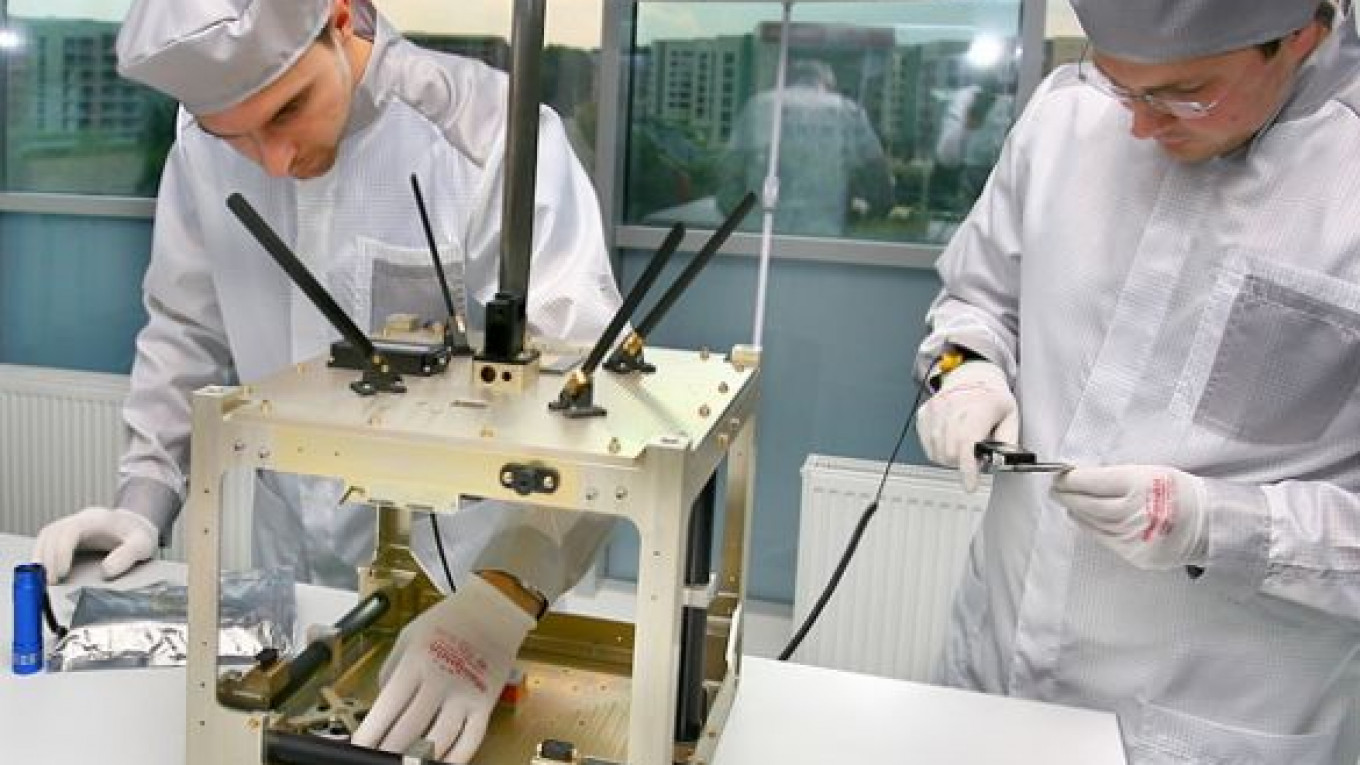Dumping his stakes Russian retailers selling domestic appliances and DIY hardware, Mikhail Kokorich founded the first private satellite manufacturer to emerge from Russia and is due to send his first devices into orbit next year.
Striking out from the country that pioneered space flight, his Dauria Aerospace intends to build small low-cost satellites, provide data and telecom services, and break into a market that grew to $128 billion last year, according to the U.S.-based Satellite Industry Association.
Kokorich transformed himself into a satellites industry player in 2011 after making money at electronics chain Tekhnosila and at the Uyutterra brand of domestic goods stores — similar to U.S.-based Bed Bath & Beyond. He has since sold out of both companies, last year and this year, respectively.
He said he drew inspiration from the success of foreign manufacturers of small satellites, listing U.S.-based Sierra Nevada and Skybox; Britain's Surrey Satellite Technology; and Germany's OHB.
Illustrating his enthusiasm for the project, Kokorich also started taking flying lessons after founding his company in the San Francisco area, where he spends most of his time.
His idea was that a company with roots in Russia, the country that sent the first satellite and human into space, would be nothing to sneeze at.
"A company that originated in Russia has all the preconditions for successful competition on this market by virtue of its access to skilled staff and rich engineering culture," Kokorich said.
Dauria has chosen the German city of Munich for its main office, however. In Russia, it runs an assembly facility at the high-tech research and development center at Skolkovo, outside Moscow, where it builds satellites for the local market.
Dauria also has a facility at NASA Research Park at Silicon Valley, where it makes devices for international customers.
According to Ilya Golubovich, a founding partner of I2BF, the multinational venture capital firm that bought into Dauria last month, both Russia and the U.S. have their local-content requirements, which companies can only satisfy by establishing separate production and assembly each country.
"The industry is fairly politicized," he said. "It is difficult to sell in America a satellite that has been assembled in Russia, and the other way round: It is difficult to sell in Russia a satellite that has been assembled in the U.S."
Dauria will launch its first satellite in February. Contracted by the Transport Ministry, the DX-1 will provide positioning services for Russia's river-going boats.
A Federal Space Agency, or Roscosmos, rocket will take the device into space.
Dauria wants to expand its presence above the atmosphere quickly, planning to have a total of six various satellites in orbit by the end of next year, Kokorich said in a phone interview from the San Francisco area. Four will work in concert, forming the company's own constellation. The remainder will serve outside customers.
He did not say if all of them will take off onboard Roscosmos rockets.
Dauria has a portfolio of satellite contracts worth "tens of millions of dollars" though 2017, and counts NASA as one of the launch service providers, he said.
Kokorich said Roscosmos, the company's key partner in Russia, proved accommodating. The government quickly realized that a private contractor would save state funds by developing satellites for public needs at a lower cost, he said.
"It was not much of a problem to come to terms to Roscosmos," he said. "It turned out to be easier than it had seemed."
A call to the Roscosmos press department went unanswered Sunday.
In addition to building satellites, Dauria wants to make money on data, such as images of the Earth's surface recorded from space. The plan is to feed data from Dauria's and other owners' satellites, as well as from drones operated by other companies, into a cloud-based storage platform. Outside developers, such as governments, farmers and real estate companies, would then purchase the information for their software and operations.
The platform is scheduled to open for customers next month.
Kokorich said he had invested "several tens of millions of dollars." I2BF injected another $20 million in the company, buying a minority stake and posting two directors to Dauria's board.
"We will be involved a lot in shaping the development strategy for the business," Golubovich, the fund's co-founder, said.
Contact the author at [email protected]
A Message from The Moscow Times:
Dear readers,
We are facing unprecedented challenges. Russia's Prosecutor General's Office has designated The Moscow Times as an "undesirable" organization, criminalizing our work and putting our staff at risk of prosecution. This follows our earlier unjust labeling as a "foreign agent."
These actions are direct attempts to silence independent journalism in Russia. The authorities claim our work "discredits the decisions of the Russian leadership." We see things differently: we strive to provide accurate, unbiased reporting on Russia.
We, the journalists of The Moscow Times, refuse to be silenced. But to continue our work, we need your help.
Your support, no matter how small, makes a world of difference. If you can, please support us monthly starting from just $2. It's quick to set up, and every contribution makes a significant impact.
By supporting The Moscow Times, you're defending open, independent journalism in the face of repression. Thank you for standing with us.
Remind me later.






